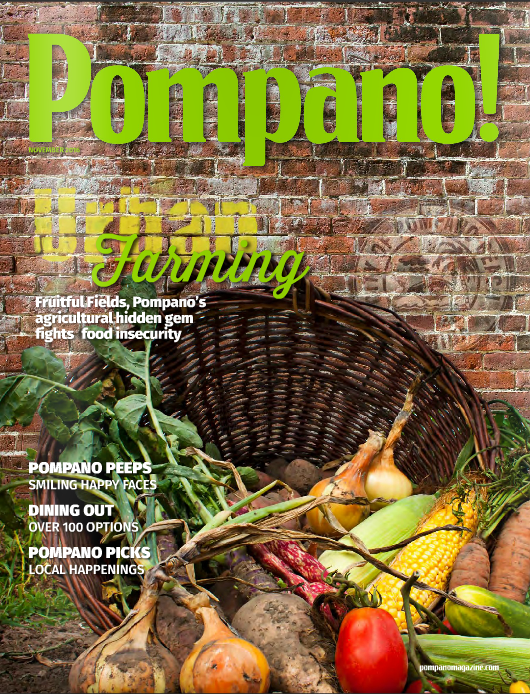The 2016 Bridge the Meal Gap Study calculates that 15.5 percent of the Broward County population is food insecure. Some Broward County organizations are exploring urban farming as one weapon in the fight against food insecurity. Pompano Beach’s own Fruitful Fields — a nonprofit, urban farm — offers a glimpse into one organization’s grassroots approach.
Feeding South Florida — a member of the Feeding America food bank and Florida’s largest domestic hunger-relief organization — has released its latest 2016 Map the Meal Gap Study. The study calculates food insecurity numbers by using county-level data on average food costs from the Nielsen Company to break down the food budget shortfall of South Florida residents. The study then approximates the number of meals missing from the tables of people at risk of hunger in South Florida each year.
The 2016 data shows a food budget shortfall of $454 million per year in South Florida — which equals a shortfall of $19.10 per person, per week (or about two days worth of food per week). Based on income, that means 784,110 people (13.4 percent of the population of South Florida) is at risk of hunger.
In Broward County, the percentage is even higher: According to the study, Broward County has the most over all food insecure residents in South Florida, with 15.5 percent of the total population designated food insecure.
“Food insecurity” refers to USDA’s measure of “lack of access, at times, to enough food for an active, healthy life for all household members, and limited or uncertain availability of nutritionally adequate foods.”
Even more striking, the study calculated that 21.5 percent — or about one out of five children — in South Florida are food insecure.
 According to Florida Kids Count (a department of Child & Family Studies at the University of South Florida), over 157,000 students (59.9 percent) in Broward County public schools qualified for the free or reduced lunch program in the 2013-2014 school year.
According to Florida Kids Count (a department of Child & Family Studies at the University of South Florida), over 157,000 students (59.9 percent) in Broward County public schools qualified for the free or reduced lunch program in the 2013-2014 school year.
“It took a number of eye-opening visits to local food banks and many conversations with people struggling to find their next meal to understand that hunger in America is a very real problem,” said philanthropist Howard Buffet — son of Warren Buffet and founder of a multi-billion-dollar organization that fights global hunger.
In the face of these numbers, which show only slight improvement in the last three years (a decrease of about 2 percent), a vast array of organizations at the local, statewide and national level are fighting to create more equitable, sustainable, stable and nutritious food systems. These organizations include food pantries, soup kitchens, policy councils, advocacy groups, non-profit organizations, churches and synagogues. In Broward County alone, there are dozens of organizations aimed at helping the hungry and rethinking south Florida’s food systems.
With the popularization of the farm-to-table and slow food movements, many of these organizations have recognized local, urban farming as one weapon in the fight against food insecurity. Among such organizations is Pompano Beach’s Fruitful Fields — a grassroots non-profit organization and hidden gem of urban agriculture.
FRUITFUL FIELDS
Tucked away in the Tedder neighborhood, just east of I-95 behind the Parkway United Methodist Church, Fruitful Fields is an island oasis in a sea of homes, schools, freeways and retail stores.
November marks the beginning of harvest season, which means the field will soon be brimming with vegetation, including tomatoes, eggplant, collard greens, Tuscan kale, arugula, green beans, bananas, broccoli, herbs, medicinal plants and more.
Fruitful Field’s goal is to educate youth in the art of agriculture, provide fresh food to the surrounding neighborhoods, help stock local food banks, pantries and soup kitchens, and creatively use farming to engage, educate and mentor individuals in the community. The Field has several programs aimed at accomplishing these goals, including a Community Supported Agriculture (CSA) crop share with a fifty-fifty, buy-give setup; a paid youth internship program called GrowCity, which targets disadvantaged youth; weekly free meals for the hungry; and a large number of volunteer opportunities.
Fruitful Fields started in 2008 with about two dozen plots for people in the community to grow their own vegetables, help feed their families and exchange tips. The organization’s co-founder, Flavio Sloat, said South Florida can be a difficult place to grow for even experienced farmers.
“If you’re coming from Jamaica or the Bahamas or somewhere like that you’re fine,” said Sloat. “But if you’re coming from Connecticut or Ohio, it’s really, really hard. You get the seasons wrong. You think that the soil has more nutrients than it really does, so you way under-fertilize. You don’t know how pests work. And we have different pests here.”
In the beginning, Sloat envisioned Fruitful Fields as a place for growers to learn. As the program developed, however, Sloat (who left his career as an attorney to pursue his passion work in organic farming) realized the Field had far more potential.
“Early on we decided that if we were going to grow food — if we were going to make an impact in food and education — we were going to have to professionalize it a bit. It couldn’t be haphazard, small holders just doing their 10-by-10 plots. It would need to be an organized operation.”
That’s when Fruitful Fields found a small grant for fruit trees through the Community Foundation of Broward.
“After that we actually started doing what we considered urban farming,” said Sloat.
Now the center of the field boasts banana trees, Barbados cherries, figs and papayas — an “urban forest kind of thing” said Sloat. To the east of the fruit trees are the community plots. Sprinkled around the property are a whole host of plants and growing zones, ranging from herbs to vegetables and medicinal trees. There are Neem trees (used for tooth paste and indigestion) and Moringa Oleifera — the so-called “miracle tree.”
“We have some Moringa trees growing along the back fence line and everyday people will come and lean over and harvest it because it’s a known medicinal kind of thing,” said Sloat.
On the backside of the church, there’s an aquaponics tank, which uses fish waste to help fertilize the plants, and in the garden are a network of bee hives where Sloat and volunteers harvest raw honey. An outdoor kitchen stands on the edge of the field where Fruitful Fields hosts a community meal on Wednesday nights. In season, the meal features a fresh salad made with 100 percent home-grown vegetables. The community meal is free and open to the public.
There’s enough food to go around. Last year, Fruitful Fields harvested 7,500 pounds of food, not including what was grown in the community plots.
In addition to operating the farm, Fruitful Fields started GrowCity, a program for disadvantaged youth in which a small number of young people ages 14 to 17 can participate in paid after school internships in which they learn about agriculture and are mentored in things like public speaking. The program had its pilot year last year with five participants; this year GrowCity has accepted ten, and has four on a waiting list. Of the ten participating youth, nine are Haitians and Hispanics from the Tedder community; one is a “diversity candidate” from Boca Raton, Sloat said jokingly.
“Tedder is a very poor community that has no jobs for teenagers,” he said.
The GrowCity participants come after school to farm, and, one night a week get to participate in a group meal, which they cook themselves in the outdoor kitchen.
“We do a lentils and brown rice dish every week. We give them a list of what they can go pick to put into the pot and we give them five minutes. They go running around and then we put it in the pot and we get it cooking,” said Sloat. “Then we work, and then we come back and eat together. It’s training them about different food habits.”
A LESSON IN COOKING
This education in cooking and food habits, Sloat says, is not only important for the GrowCity participants, but also for their families and the community at large. In the past, Fruitful Fields gave away shares of their crops to local families in-need, but what Sloat found is that many of the families didn’t know how to best utilize the donation within the framework of their lives and schedules.
“We’ve done some experiments with giving food out to needy families,” explained Sloat, “but often what we’ve found is that they would come back the next week and say they didn’t have time to cook it or weren’t able to for one reason or another. I think a lot of food insecurity has to do with creating food — cooking food. It is really seen as something that is optional, or that they don’t have time for, or they don’t know how to do anymore.”
Sloat says he sees the problem get incrementally worse for immigrant families the longer they assimilate to U.S. culture.
“When folks are recent immigrants here, they still will want the fresh produce. They want the greens. But as those same people get mired in poverty or have very complicated schedules, with very limited transportation, they start eating worse and worse foods,” said Sloat. “They will use their food stamps and just buy the easy foods to prepare that are often the cause of certain kinds of sugar addictions and high starch diets. Not only are the youth hungry, but they are hungry for real food.”
Breaking the cycle can be hard.
“These families in poverty are so pressed for time, and so on the edge financially and emotionally that they often don’t see their ability to cook,” said Sloat. “So having ready-made meals here that are actually cooked in a traditional, old-fashioned kind of way, like on Wednesday nights, and teaching the youth that, hey, maybe they need to take over the family cooking two or three nights a week, is a way of reversing the trend.”
In addition to GrowCity and the Wednesday night meal, Fruitful Fields offers CSA membership with a fifty-fifty, buy-give setup. Fruitful Fields has operated the CSA for four years now and it has grown incrementally. People from Broward county can sign up to receive a monthly share of fresh produce , which they can pick up at Whole Foods market in Pompano Beach or at Fruitful Fields. The box of produce comes with recipe ideas to cook the seasonal goods.
There are three levels of CSA shares: a full garden share, which is $160 per month; a half/sampler garden share, which is $100 per month; and green shares, which are $100 per month. These CSA shares are priced above market value so that half of the proceeds go toward the CSA member’s produce, 30 percent goes to donate produce to local food banks and soup kitchens, and the other 20 toward the GrowCity program’s paid internships. Members of Fruitful Fields’ CSA get a 50 percent tax write-off on the cost of their share. Interested participants can sign up at thefruitfulfield.org and pay monthly via PayPal.
A MODEL TO SHARE
Sloat said that although Fruitful Fields is significantly more humble in scale than some other food programs like Feeding South Florida, the grassroots nature of Fruitful Fields has its benefits and potential.
“I think it’s a good model,” said Sloat. “A great thing about using church property is that it doesn’t have the politics and the complications like city land does. And a lot of churches have available space.”
For example, in the 60s, the United Methodist church where Fruitful Fields now lives had planned on building a school, which was never built.
“There are a lot of churches like that — that have bought property cheap, but have it sitting around empty,” said Sloat. “So if they can become convinced that this is a way to re-think community engagement, it is a great thing.”
The Fruitful Fields’ model already spawned a similar program in Margate, FL called the Green Earth Community Garden after some of Green Earth’s founders apprenticed at Fruitful Fields for a year. The Green Earth Community Garden similarly offers the community fifty-fifty, buy-give CSA crop shares.
In addition to church land, Broward County has an abundance of available land. A study conducted by Anthony Olivieri, a community food systems consultant for the Broward Regional Health Planning Council and the founder of FHEED (Food for Health, the Environment, Economy & Democracy), found that on the current available, empty, private and public land in the county, Broward could satisfy roughly 80 percent of its own fresh fruit and vegetable needs. Sloat believes with a little available space and some creativity, there’s hope to decrease food insecurity in Broward. Though, he said it is important to note that food insecurity is not solely about food, rather stems from many social ails. He encourages people to think holistically.






